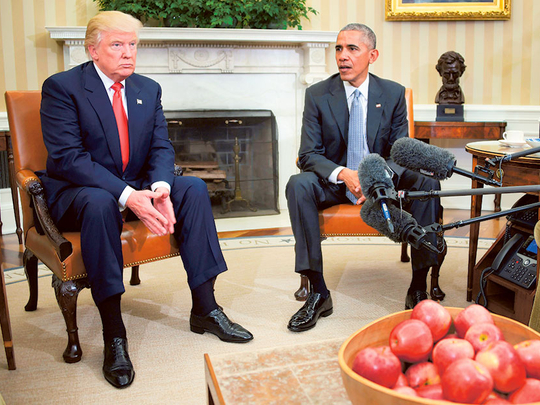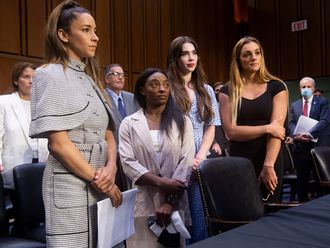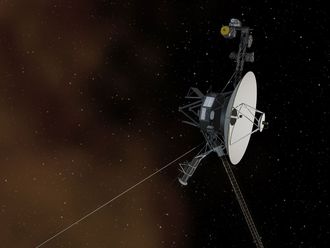
Washington: Only two days after the election, President Barack Obama sat by President-elect Donald Trump’s side in the Oval Office and declared that the No. 1 priority in his last days in the White House would be ensuring a smooth transition of power.
What Obama did not say was that he also intended to set up as many policy and ideological roadblocks as possible before Trump takes his oath of office on January 20.
With less than three weeks before the Obama White House is history, making way for a new administration with radically different priorities, the president is using every power at his disposal to cement his legacy and establish his priorities as the law of the land.
He has banned oil drilling off the Atlantic coast, established new environmental monuments, protected funding for Planned Parenthood clinics, ordered the transfer of detainees from Guantanamo Bay, criticised Israeli settlements and punished Russia for interfering in the recent elections through cyberattacks.
The next president may be able to roll back some, or even most, of those actions, a point that Obama’s top aides concede. But every step the president takes requires Trump to overcome one more legislative or procedural hurdle as he seeks to change direction in Washington.
Leaving his own crew in charge
Obama is continuing to fill the ranks of the government with his own appointees; since Election Day, he has named 103 people to senior Civil Service jobs, boards, key commissions and oversight panels, including the National Council on Disability, the Amtrak board of directors, the Holocaust Memorial Council and the boards of visitors at military academies.
He is also pushing ahead with his goal of freeing nonviolent drug offenders from federal prisons. In the last few weeks, he has commuted the sentences of 232 federal inmates and pardoned 78 others. And Wednesday, he will meet with Democratic lawmakers to discuss ways to protect the Affordable Care Act from efforts by Trump and Republicans to dismantle it.
To many conservatives, Obama is acting out of spite as much as conviction. “He’s doing all this stuff as his legacy,” said Newt Gingrich, the former House speaker, comparing Obama to a petulant God in a Wagner opera. “If he goes through three more weeks of this stuff, who is the country going to think is the extremist? Trump or Obama?”
Change is here
White House aides note that many of the president’s last-minute actions were put in motion months or even years before the outcome of the election was clear. And none break from the ideological approach Obama took during his eight years in office.
But they represent a determination by the 44th president to squeeze in every last Obama-era achievement before Trump — who has vowed to dismantle those achievements — takes over. That has cheered some of Obama’s liberal allies, who wish he could do even more.
“The Republicans are freaking out because all of a sudden Obama is doing a lot of governing,” said Matt Bennett, senior vice-president for public affairs at the Third Way, a liberal think tank. “They don’t like it. I get that. But he’s in his right to do it, and he should do it. Is he trying to box Trump in? You bet — and he should.”
Obama’s actions have not gone unnoticed by Trump and the people working frantically to assemble the new administration. A day after Obama allowed passage of a United Nations (UN) Security Council resolution criticising Israeli settlements, Trump angrily wrote on Twitter that the move would “make it much harder to negotiate peace.” Trump added, optimistically: “Too bad, but we will get it done anyway!”
Two days later, in a sign of his growing frustration with Obama, Trump posted again on Twitter, saying he was doing his best to “disregard the many inflammatory President O statements and roadblocks.”
He continued, “Thought it was going to be a smooth transition — NOT!”
That Twitter message apparently prompted a phone call from Obama the next day, when the president and president-elect tried to re-emphasise their cooperation. Obama’s spokesman issued a statement calling the discussion positive, saying both men had pledged to “work together to effectuate a smooth transition of power on January 20th.”
That evening, from his Mar-a-Lago estate in Florida, Trump insisted that the transition was going “very, very smoothly” and said his talk with Obama had been a “very, very nice” conversation.
Full cooperation
“Our staffs have been getting along very well, and I’m getting along very well with him other than a couple of statements that I responded to,” Trump said.
White House officials are quick to insist that Obama has ordered all levels of government to cooperate fully with Trump on the mechanics of the transition. That directive stands, they said, regardless of the ideological gulf between the two men.
Obama’s most permanent action may be his order banning oil drilling off the Atlantic coast, a decision rooted in a 1953 law that experts say will be legally difficult for Trump to reverse. Environmental groups and other liberal advocacy organisations are hoping for more such moves by Obama, up until his last moments in office.
“The Constitution lays out that the president is president to January 20 at noon,” said Neera Tanden, president of the Center for American Progress, a liberal think tank in Washington.
Tanden said Obama’s actions were bolstered by approval ratings significantly higher than Trump’s, a historical oddity. Most modern incoming presidents bask in the glow of postelection polling, while those leaving the White House have worn out their welcome.
Obama is “appropriately reading that as full steam ahead,” Tanden said. “The president rightly sees that the American people are supporting the actions he is taking.”












